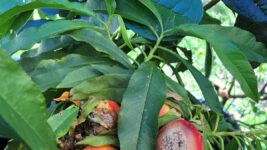
Gareth Carter: Top tips for September gardening
For a tree, I recommend three stakes. One against the trunk to give support to the stem and then one either side that stops the tree from rocking in the wind.
Time to guard for cold and frost
Another event to be prepared for is late frosts. There is always the risk of a cold snap coming across the country.
This can be particularly devastating to freshly planted-out cold-sensitive summer vegetable seedlings, subtropical and other frost-tender plants.
Have frost cloth and cloches on hand.
Time to spray for brown rot on peaches and nectarines
It is also time to spray for protection against brown rot that destroys peaches, nectarines and sometimes apricots and plums, just as they ripen. Many people come looking for a remedy each year when their fruit is rotting. The only fix for this is preventative spraying soon.
Make sure you have on hand Yates Fungus Fighter or a newer biological spray, Botryzen.
Botryzen is a natural fungus which colonises the fruiting area preventing pathogenic rotting fungi or bacteria from establishing.
Either of these should be sprayed onto peaches and nectarines once at commencement of flowering, once in full bloom, once at petal fall and once at shuck fall.
Time to spray for curly leaf protection on peaches and nectarines
Flower and leaf buds on peaches and nectarines are certainly starting to swell. Now is the time to apply Freeflo copper and Enspray 99 oil to prevent curly leaf and get rid of any residual insect problems.
These certified organic oil and copper sprays can be used on all fruit trees as a winter clean-up which will help to remove overwintering insect larvae and kill fungus spores. This will reduce pest and disease incidence in the coming summer. I recommend doing this spray twice, two weeks apart.
Time to plant seed potatoes
Spring has arrived and now is the time to start your main crop production of potatoes.
Potatoes are easy to grow. It is important to select a good spot for them as potatoes need a sunny (at least five hours a day) position where they will not compete for moisture.
They also benefit from being in a sheltered area that does not receive strong winds.
Next, the soil needs to be “well worked” – this means it has been dug over to a depth of 25-30cm.
This will allow the potatoes to grow and multiply.
The addition of organic matter such as compost or sheep pellets will be beneficial as they not only add nutrients, but will also help hold moisture for longer. Potatoes are a tuber that form on part of the stem underground.
By “mounding up” soil around the stem as the plants grows, you will increase the amount of stem underground and the yield from each potato plant.
Time to spray your lawn for prickles
Do you want to walk on your lawn in bare feet this summer? Now is the time to spray your lawn with Growsafe Prickle Weedkiller. If you have a plethora of other weeds then use a product that can be clicked onto the hose for ease.
Yates Weed and Feed will take out the weeds and feed the grass in one application. An application of this in spring, summer and autumn every year will keep your lawn in pretty good nick.
Time to prepare for your summer vegetable garden
If your vegetable garden has not been touched for a while, then now is the time to weed, clear, dig and feed the soil.
The success of vegetables depends on the weather conditions and the soil. Great soil gives great vegetables. As you regularly harvest vegetables you need to regularly ensure the soil is replenished.
Use a rich compost (not a cheap filler of pine bark called compost); the poultry-based Ican Premium Compost and Easy Earth Compost are highly recommended.
A balanced fertiliser such as Ican Organic Vegetable Food is also a great product for use before planting and as a side dressing later.
These products will help with soil structure and fertility which need to be addressed regularly for a successful vegetable garden.
Vegetables take a lot of nutrients from the soil so ongoing regular additions of products such ascompost, Tui Sheep Pellets and Ican Organic Vegetable Food will replace these and produce a more friable soil suitable for vegetable growing.
Most vegetables prefer a neutral pH to alkaline soil i.e. pH 7-8. It is recommended to dust the soil annually with Garden Lime to maintain the slightly alkaline soil and improve the soil structure. An alkaline soil increases the availability of many nutrients in the soil and makes them more readily available for plant uptake.
Time to plant herbs
If you have been thinking about growing your own herbs, now is a great time of year to get started.
Herbs generally thrive in warm temperatures where, if kept well-watered, they grow fast during the spring and summer months. It is this fast soft growth that is so good for harvesting and using in many culinary delights.
Many herbs are not only purposeful but can be grown simply for their ornamental value.
Gareth Carter is the general manager at Springvale Garden Centre.



